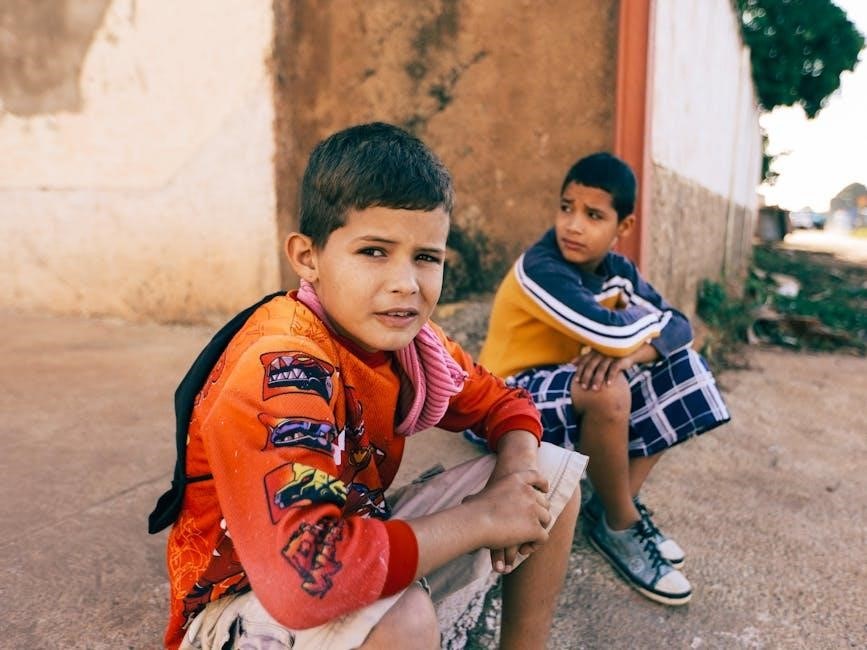Social Emotional Learning (SEL) is a crucial approach to education, fostering personal growth, emotional health, and decision-making skills. It equips students to navigate life challenges effectively, promoting academic success and positive relationships. By integrating SEL into curricula, schools create supportive environments where students thrive emotionally, socially, and academically, laying the foundation for lifelong well-being and achievement.
What is Social Emotional Learning (SEL)?
Social Emotional Learning (SEL) is the process through which individuals acquire and effectively apply the knowledge, attitudes, and skills necessary to understand and manage emotions, set and achieve goals, feel and show empathy for others, establish and maintain relationships, and make responsible decisions. It is essential for personal and academic growth, helping students develop self-awareness, self-management, and social skills. SEL fosters a supportive environment where individuals can thrive emotionally, socially, and academically, preparing them for success in school and life. It is a cornerstone of a well-rounded education, supported by organizations like CASEL and integrated into curricula worldwide to promote life skills and overall well-being.
The Importance of SEL in Education
Social Emotional Learning (SEL) is vital for academic success and personal growth. It helps students manage emotions, build relationships, and make responsible decisions. By fostering empathy, self-awareness, and communication skills, SEL creates a supportive learning environment. It also addresses critical issues like bullying and stress, promoting mental health and well-being. Implementing SEL curricula equips students with essential life skills, preparing them for future challenges and fostering a positive school culture that benefits everyone involved;

Core Competencies of Social Emotional Learning
Social Emotional Learning (SEL) comprises five core competencies: self-awareness, self-management, social awareness, relationship skills, and responsible decision-making. These skills foster personal and academic growth, enabling students to thrive.
Self-Awareness
Self-awareness is the ability to recognize and understand one’s emotions, strengths, and weaknesses. It forms the foundation of SEL, enabling individuals to regulate emotions, set goals, and develop a positive self-image. Through mindfulness activities and reflective practices, students gain insight into their thoughts and feelings, fostering emotional regulation and resilience. This competency is crucial for personal growth and decision-making, helping learners navigate challenges with confidence and self-understanding. By cultivating self-awareness, SEL curricula empower students to take ownership of their emotional and academic journeys, leading to improved mental health and overall well-being.
Self-Management
Self-management involves controlling emotions, behaviors, and motivations to achieve goals. It empowers individuals to handle stress, stay focused, and make responsible choices. SEL curricula teach techniques like mindfulness, goal-setting, and self-monitoring to enhance self-regulation. This competency is vital for academic success, as it helps students maintain persistence and adapt to challenges. By mastering self-management, learners develop resilience, leading to improved mental health and personal growth. Effective self-management skills enable individuals to balance emotions and actions, fostering a positive and productive mindset in both academic and life settings.
Social Awareness
Social awareness is the ability to understand and appreciate the perspectives of others, fostering empathy and respect for diversity. SEL curricula teach students to recognize social norms, biases, and the emotions of those around them. This competency helps individuals build positive relationships and contribute to inclusive environments. By developing social awareness, learners gain the skills to navigate complex social situations, communicate effectively, and address conflicts constructively. It promotes a deeper understanding of others’ experiences, fostering a culture of kindness, collaboration, and mutual respect in schools and communities.
Relationship Skills
Relationship skills are essential for building and maintaining healthy connections with others. SEL curricula emphasize communication, cooperation, and conflict resolution, helping students form strong, positive relationships. These skills enable individuals to actively listen, express empathy, and work collaboratively. By fostering trust and respect, relationship skills promote a supportive social environment. Effective relationship-building not only enhances academic success but also prepares students for lifelong personal and professional interactions, ensuring they can navigate diverse social dynamics with confidence and understanding.
Responsible Decision-Making
Responsible decision-making is a critical SEL competency, empowering individuals to make thoughtful choices. It involves analyzing situations, considering consequences, and choosing ethical actions. SEL curricula teach students to weigh options, reflect on impacts, and act responsibly. This skill fosters integrity, accountability, and problem-solving abilities. By practicing responsible decision-making, students develop the capacity to navigate challenges effectively, contributing to their personal growth and the well-being of others. This competency is vital for creating a positive, respectful, and productive learning environment.

Benefits of Implementing SEL Curricula
Improved behavior, academic performance, and emotional well-being are key outcomes. SEL fosters better relationships, responsible decision-making, and lifelong skills, preparing students for future success and challenges.
Improved Academic Performance
SEL curricula enhance academic performance by fostering self-awareness, self-management, and responsible decision-making. Students develop better focus, problem-solving skills, and critical thinking, leading to improved grades and test scores. SEL also promotes a positive classroom environment, reducing behavioral issues and increasing engagement. By addressing emotional and social challenges, SEL helps students stay motivated and resilient, creating a strong foundation for academic success. Research consistently shows that SEL programs positively impact student outcomes, making them a valuable investment in education.
Enhanced Mental Health and Well-Being
Social Emotional Learning (SEL) curricula play a vital role in enhancing mental health and well-being by teaching students to manage emotions, reduce stress, and develop empathy. SEL fosters resilience, helping students cope with challenges and build positive relationships. By incorporating mindfulness and emotional regulation techniques, SEL programs create a supportive environment that promotes self-care and overall well-being. This leads to healthier emotional and psychological outcomes, enabling students to navigate life’s difficulties with confidence and balance.
Better Relationship Building
Social Emotional Learning (SEL) curricula foster stronger, more positive relationships among students, teachers, and peers. By teaching skills like empathy, active listening, and cooperation, SEL helps students connect meaningfully with others. These skills reduce conflicts and promote inclusivity, creating a supportive environment where everyone feels valued. Strong relationship-building abilities also enhance collaboration and mutual respect, laying the foundation for lasting friendships and a positive school culture. Ultimately, SEL equips students with the tools to navigate social dynamics effectively, preparing them for successful interpersonal interactions throughout their lives.

Instructional Approaches for SEL
Effective SEL instruction uses evidence-based curricula and age-appropriate strategies, ensuring engaging and relevant learning experiences that promote skill development across all grade levels and backgrounds.
Evidence-Based Curricula
Evidence-based SEL curricula are designed to ensure effectiveness through research-backed strategies. These programs, like “Empowering Minds,” blend mindfulness and cognitive-behavioral techniques to foster self-awareness and responsible decision-making. They align with standards such as CASEL and Illinois SEL goals, ensuring comprehensive skill development. Professional development for educators is often included, providing tools to implement curricula successfully. By focusing on measurable outcomes, these programs create a supportive learning environment, promoting academic and personal growth while addressing diverse student needs and school cultures.
Age Appropriateness in SEL Programs
Age appropriateness is crucial in SEL programs to ensure content aligns with students’ developmental stages. Curricula are tailored to address the unique needs of different age groups, from self-awareness and cooperation in younger students to conflict resolution and leadership in older students. Programs like “Empowering Minds” are designed for K-8, blending mindfulness and cognitive-behavioral techniques to match developmental milestones. This ensures that skills are introduced progressively, fostering social and emotional growth in a way that is both engaging and effective for students at every level.

Examples of SEL Curricula
Empowering Minds is a K-8 mindfulness-based SEL curriculum blending mindfulness, cognitive-behavioral theory, and best practices. CASEL-approved programs offer evidence-based frameworks for emotional growth.
Empowering Minds: A K-8 Mindfulness-Based SEL Curriculum
Empowering Minds is a comprehensive K-8 SEL curriculum rooted in mindfulness and evidence-based practices. It combines mindfulness techniques with cognitive-behavioral theory to help students develop self-awareness, self-management, and social skills. The curriculum aligns with CASEL’s framework, offering age-appropriate lessons that foster emotional growth. By integrating mindfulness, it helps students manage stress, build resilience, and improve focus. This holistic approach supports academic success and lifelong well-being, making it a valuable tool for educators seeking to enhance students’ emotional and social development.
CASEL-Approved SEL Programs
CASEL-approved SEL programs are evidence-based curricula that meet rigorous standards for promoting social-emotional learning. These programs are carefully evaluated to ensure they align with CASEL’s framework, fostering skills like self-awareness, self-management, and relationship building. They are designed to be age-appropriate and adaptable to various educational settings. By implementing CASEL-approved programs, schools can ensure high-quality SEL instruction that supports students’ emotional growth, academic success, and long-term well-being. These programs are widely recognized for their effectiveness in creating positive learning environments.

Implementation Strategies
Effective SEL implementation involves professional development for educators, creating a supportive school culture, and using data to guide practices. Aligning SEL with academic goals ensures success.
Professional Development for Educators
Professional development is vital for educators to effectively implement SEL curricula. Training programs and workshops help teachers understand SEL competencies, such as self-awareness and relationship skills. Collaborative planning and coaching enable educators to integrate SEL into daily instruction. Schools should prioritize ongoing support, ensuring educators feel confident in modeling and teaching SEL skills. This fosters a positive school culture and aligns SEL with academic goals, ultimately benefiting both students and staff. Continuous professional growth ensures SEL initiatives are sustainable and impactful.
Integrating SEL into Classroom Instruction
Integrating SEL into classroom instruction involves embedding social-emotional skills into academic lessons. Teachers can use evidence-based curricula to connect SEL competencies with subject matter, fostering a holistic learning experience. Strategies include modeling SEL skills, encouraging student reflection, and incorporating mindfulness practices. By aligning SEL with academic goals, educators create a supportive environment that promotes emotional growth and academic success. This approach ensures students develop essential life skills while meeting educational standards, preparing them for future challenges and fostering a positive classroom culture.

Standards and Frameworks for SEL
Social Emotional Learning standards, like Illinois SEL Standards, provide clear benchmarks for student development. Frameworks such as CASEL’s Five SEL Competencies guide curriculum design, ensuring alignment with educational goals and promoting holistic student growth.
Illinois Social Emotional Learning Standards
The Illinois SEL Standards provide a comprehensive framework for developing social-emotional skills across grades. They emphasize self-awareness, self-management, social awareness, relationship skills, and responsible decision-making. These standards guide curriculum design, ensuring alignment with educational goals and promoting student well-being. By addressing developmental needs, the Illinois SEL Standards help create supportive learning environments, fostering academic success and lifelong skills. Schools use these standards to assess progress and tailor instruction, ensuring equitable opportunities for all students to thrive socially and emotionally. This framework is integral to holistic education in Illinois.
Aligning SEL with Educational Goals
Aligning SEL with educational goals ensures a holistic approach to student development, fostering academic success and lifelong skills. By integrating SEL into curricula, schools promote self-awareness, empathy, and responsible decision-making, which enhance learning environments. SEL supports academic achievement by improving engagement, self-management, and collaboration. It also addresses broader educational objectives, such as preparing students for future challenges and fostering a sense of responsibility. This alignment creates a supportive ecosystem where students can thrive academically, socially, and emotionally, achieving their full potential.
Social Emotional Learning (SEL) is a transformative approach, fostering holistic student development. Its integration into education ensures students are prepared for future challenges, promoting emotional well-being and academic success.
The Future of SEL in Education
Social Emotional Learning (SEL) is poised to become a cornerstone of modern education, fostering resilience, empathy, and lifelong success. As schools prioritize holistic development, SEL curricula will evolve to address diverse student needs, leveraging technology and cultural relevance. Professional development for educators will ensure effective implementation, while research will refine evidence-based practices. By integrating SEL into daily instruction, schools can create inclusive environments that nurture both academic and emotional growth, preparing students to thrive in an ever-changing world and fostering a compassionate, equitable society for future generations.

Leave a Reply
You must be logged in to post a comment.